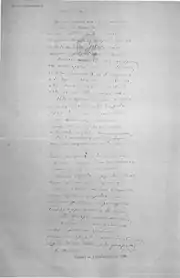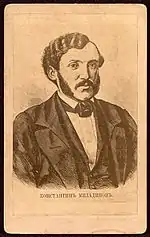Taga za Yug
Taga za Yug (Originally spelled in non-standardized Bulgarian orthography: Тѫга за югъ, Bulgarian: Тъга за юг, Macedonian: Т'га за југ,[1] in English "Longing for the South") is the name of a famous poem by the Bulgarian National Revival poet Konstantin Miladinov.[2][3][4][5] It is a patriotic-reflexive song in which the author, who lives in Moscow, expresses his homesickness for his homeland.[6] By the end of the 1850s, Bulgarian poets as Miladinov started to write lyric poetry in vernacular.[7] This poem is written specifically using the Struga dialect.[8]

Publication
_issue_20_from_February_7%252C_1861%252C_p._88.jpg.webp)
Konstantin Miladinov was educated in Athens, but later attended Moscow University (1856-60), willing to continue his studies in Slavic language instead of Greek.[9] In Moscow, Miladinov worked on the editing of the folk songs, he was given by his brother Dimitar and his Bulgarian friends, that later both brothers published as collection called Bulgarian Folk Songs.[10] Miladinov wrote the poem there in vernacular, specifically using his native Struga dialect.[11] The inspiration to write the song came after his brother, Dimitar Miladinov sent him a letter to go back to their hometown of Ohrid, where he could continue working as a teacher.[6] The grief of Constantin for his homeland was strengthened by his poor health.[12] "Longing for the South" was published for the first time by Bulgarian National Revival activist Georgi Rakovski in his newspaper "Dunavski lebed" issued in Belgrade on February 7, 1861. Rakovski’s association with Miladinov was a result of their struggle for the national awakening of the Bulgarians.[13]
Content

Because of the cold Moscow climate, it is these dark and dreary feelings that nurture his yearning for the warm sunshine of the South. By exclusively using positive epithets to depict the native soil, the author evokes the painful, unattainable desire to return to his homeland, symbiotically embracing it. Regarding the lyrics, he mentions several cities then in the Ottoman Empire; Stambol that is actually Istanbul, present-day Turkey, and Kukush Kilkis, present day Greece. He also mentions that he wants to see his "own places" Ohrid and Struga, present-day North Macedonia.
Modern references
Miladinov's work is considered part of the 19th century history of the Bulgarian literature.[14] In North Macedonia the poem is viewed as one of the most important Macedonian literary works under the name.[15][6][8] It is traditionally recited at the opening ceremony of Struga Poetry Evenings. It is included also in the country's school textbooks. It has been translated to more than 60 languages.[15]
In popular culture
The T'ga za Jug wine is named after Miladinov's poem. Produced in North Macedonia, the wine is semi-dry and ruby-red in color. It has been described as being similar in taste to the Italian or Californian Barbera. The rock band "Balkanski Banditi" (Balkan Bandits) with members from both Bulgaria and North Macedonia released an album with that name in 2012.[16]
References
- The absence of yer leads to an apostrophe often being used in Macedonian to print texts composed in the language varieties that use the corresponding vowel, such as this poem. For more see: Dontchev Daskalov, Roumen; Marinov, Tchavdar (2013), Entangled Histories of the Balkans: Volume One: National Ideologies and Language Policies, Balkan Studies Library, BRILL, pp. 453–456, ISBN 978-9004250765
- The struggle over the historical legacy of the name “Macedonia” was already under way in the nineteenth century, as the Greeks contested its appropriation by the Slavs. This is reflected in a letter from Konstantin Miladinov, who published Bulgarian folk songs from Macedonia, to Georgi Rakovski, dated 31 January 1861:On my order form I have called Macedonia “Western Bulgaria”, as it should be called, because the Greeks in Vienna are ordering us around like sheep. They want Macedonia to be Greek territory and still do not realize that it cannot be Greek. But what are we to do with the more than two million Bulgarians there? Shall the Bulgarians still be sheep and a few Greeks the shepherds? Those days are gone and the Greeks shall be left with no more than their sweet dream. I believe the songs will be distributed among the Bulgarians, and have therefore set a low price for them. For more see: Spyridon Sfetas, The image of the Greeks in the work of the Bulgarian revolutionary and intellectual Georgi Rakovski. Balkan Studies, [S.l.], v. 42, n. 1, p. 89-107, Jan. 2001. ISSN 2241-1674.
- It would be impossible to write a study of the Bulgarian national movement of the early nineteenth century without mentioning the Macedonians that participated in it. Leading figures, like the brothers Miladinov were born in the area which is now known as the (Former Yugoslav) Republic of Macedonia. Although Macedonian intellectuals from this period are often claimed as the founders of the Macedonian national movement, I have chosen to include them also in my analysis of the Bulgarian national movement. They declared themselves Bulgarian, and they were active in the Bulgarian public sphere. A clear illustration for this is that the brothers Miladinov included in their collection of folk songs contributions from their native Macedonia as well as contributions from throughout the Bulgarian lands and named their collection Bulgarian Folk Songs. For more see: Sampimon, J. (2006). Becoming Bulgarian: the articulation of Bulgarian identity in the nineteenth century in its international context: an intellectual history, University of Amsterdam, Pegasus, ISBN 9061433118, pp 22-23.
- Konstantin Miladinov suggested that Macedonia should be called “Western Bulgaria”. Obviously, he was aware that the classical designation was received via Greek schooling and culture. As the Macedonian historian Taskovski claims, the Macedonian Slavs initially rejected the Macedonian designation as Greek. For more see: Tchavdar Marinov, Famous Macedonia, the Land of Alexander: Macedonian identity at the crossroads of Greek, Bulgarian and Serbian nationalism, p. 285; in Entangled Histories of the Balkans - Volume One: National Ideologies and Language Policies with Roumen Daskalov and Tchavdar Marinov as ed., BRILL, 2013, ISBN 900425076X, pp. 273-330.
- Dimitar Miladinov's most famous literary achievement was the publishing of a large collection of Bulgarian folk songs in Zagreb in 1861 under the title Bulgarian Folk Songs. He published the volume with his brother Konstantin (1830-1862) and even though most of the songs were from Macedonia, the authors disliked this term as too Hellenic and preferred to refer to Macedonia as the "Western Bulgarian lands". For more see: Chris Kostov, Contested Ethnic Identity: The Case of Macedonian Immigrants in Toronto, Peter Lang, 2010, ISBN 3034301960, p. 72.
- Bogdanoska, Biljana (2008). За матуранти македонски јазик и литература [Macedonian language and literature for students] (in Macedonian). Skopje: Bomat Grafiks.
- Neubauer, John, Inna Peleva and Mihály Szegedy-Maszák. (2007) “General introduction”; p. 15; in History of the Literary Cultures of East-Central Europe, Volume III: The making and remaking of literary institutions. John Benjamins Publishing, ISBN 9027292353, pp. 1–38
- Shea, John. Macedonia and Greece: The Struggle to Define a New Balkan Nation. p. 202.
- Raymond Detrez, Historical Dictionary of Bulgaria; Historical Dictionaries of Europe; Edition 3, Rowman & Littlefield, 2014; ISBN 1442241802, p. 323.
- Raymond Detrez, The A to Z of Bulgaria; Issue 223 of A to Z Guides, Edition 2, Scarecrow Press, 2010, ISBN 0810872021, p. 284.
- By the end of 1850s Bulgarian writers started to write original lyric poetry in the vernacular. Konstantin Miladinov for instance used a simple language in Zelanie (Desire) to express emotional fluctuations; he conveyed homesickness in “Taga za yug” (Grief for the South) and other moving poems. For more see: Marcel Cornis-Pope, John Neubauer as ed., History of the Literary Cultures of East-Central Europe: Junctures and disjunctures in the 19th and 20th centuries. Volume III: The making and remaking of literary institutions, John Benjamins Publishing, 2007, ISBN 9027292353, p. 15.
- Никола Табаков, Димитър и Константин Миладинов; Библиотека "Български писатели", т. II, София, 1929, Издателство LiterNet, 27. 02. 2004.
- Among the personal contacts of the brothers Dimitar and Konstantin Miladinov with other outstanding figures of Bulgarian National Revival their relations with Georgi Stoykov Rakovski are of special interest. Dimitar Miladinov and Rakovski quickly found a common language in the struggle against the Greek Phanariot clergy. They were engaged in an active correspondence which has now been lost. Rakovski sent Miladinov his works Gorski Patnik (The Forest Traveller) and Pokazalets (Indicator). Two correspondences by D. Miladinov appeared in Rakovski’s newspaper Dunavski Lebed (Danubian Swan). Several letters from Konstantin Miladinov, the younger brother, written in answer to letters from Rakovski, are an evidence of the relations between the two men. Rakovski published in Dunavski Lebed K. Miladinov’s announcement about the forthcoming appearance of the volume of Bulgarian Folk-Songs, the work of the two brothers. Two poems by K. Miladinov were also published in it: Taga za Yug (Sorrow for the South) and Na chuzhbina (Abroad). For more see: Veselin Traykov, Georgi Stoykov Rakovski and the Miladinov Brothers in Journal: Bulgarian folklore, Year: VII/1981, Issue No: 1, Bulgarian Academy of Sciences, pp. 14-19.
- Charles A. Moser, A History of Bulgarian Literature 865–1944; Volume 112 of Slavistic Printings and Reprintings; Walter de Gruyter, 2019, ISBN 3110810603, pp. 84-85.
- Silvana Simoska “Longing for the South” by Konstantin Miladinov viewed from the perspective of the intercultural comparison of verse translations in Informatologia, Vol.41 No.2 Lipanj 2008, str. 140-148.
- Bulgarian Rock Archives.